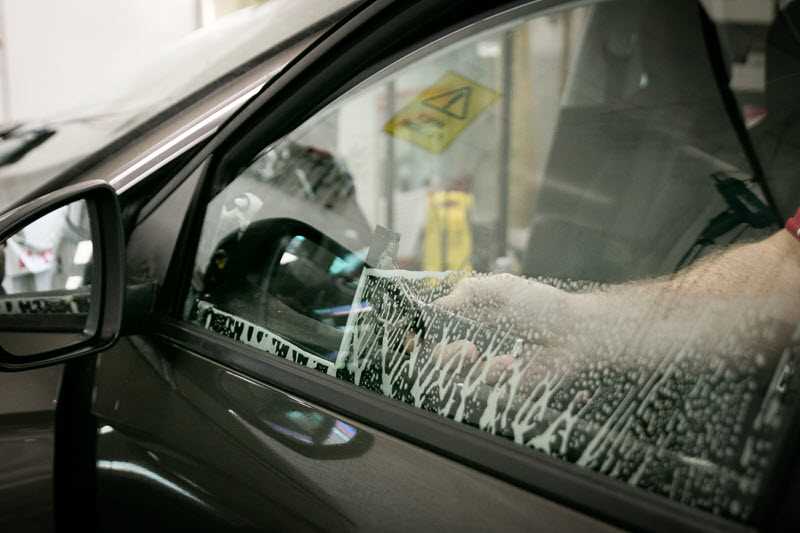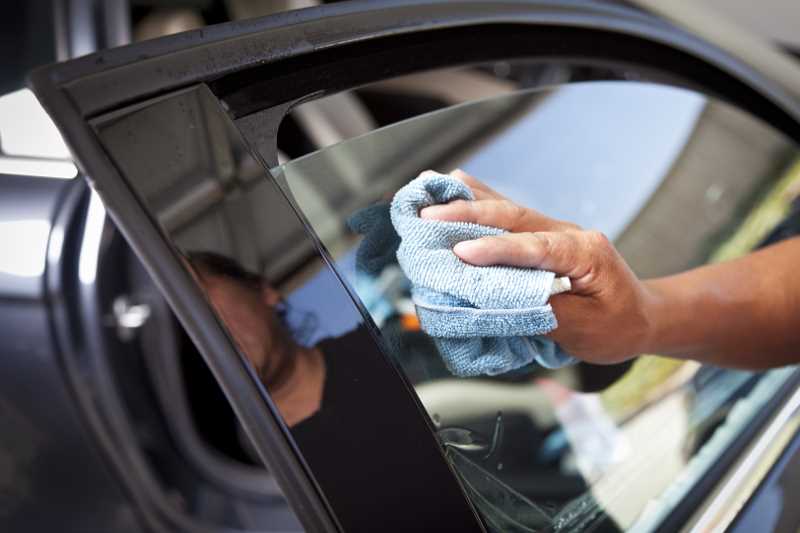Last Updated on January 31, 2024 by Vadym

If you’ve recently had your car windows tinted, you may be wondering how to properly clean them without damaging the tint. Tinted windows not only add style and privacy to your vehicle, but they also offer protection from harmful UV rays. It’s important to follow the right cleaning techniques to maintain the integrity of the tint and keep your windows looking their best.
Step 1: Gather the necessary supplies
Before you start cleaning your tinted car windows, gather all the necessary supplies. You’ll need a gentle car window cleaner, a microfiber cloth or sponge, and a bucket of water. Avoid using harsh cleaning chemicals or abrasive materials, as they can scratch or damage the tint.
Step 2: Spray the window cleaner
Spray the car window cleaner onto the microfiber cloth or sponge, rather than directly on the tinted window. This helps to prevent the cleaner from dripping onto the car’s interior and potentially damaging it. Make sure to use a car window cleaner that is safe for tinted windows and follow the instructions on the product for best results.
Step 3: Gently clean the windows
Using the moistened microfiber cloth or sponge, gently clean the tinted windows in circular motions. Avoid applying too much pressure, as this can cause the tint to bubble or peel over time. Pay attention to any areas with visible dirt or grime, and take care to remove it without scrubbing aggressively.
Step 4: Rinse and dry the windows
After cleaning, rinse the windows thoroughly with clean water to ensure that all the cleaner is removed. Then, use a dry microfiber cloth to wipe away any excess water and prevent spotting or streaks. Make sure to dry the windows completely, as water droplets can leave marks on the tint if left to air dry.
Remember, regular and gentle cleaning is key to maintaining the appearance and longevity of your tinted car windows. By following these steps, you can keep your windows looking clear and pristine with minimal risk of damage. If you have any concerns about cleaning your tinted windows, it’s always best to consult with a professional.
Importance of Cleaning Tinted Car Windows
Tinted car windows not only enhance the appearance of your vehicle, but they also provide several practical benefits. However, to maintain their functionality and prolong their lifespan, it is important to clean them regularly. Here are some reasons why cleaning tinted car windows is important:
1. Visibility:
One of the primary reasons for cleaning tinted car windows is to maintain good visibility. Over time, dirt, dust, and other debris can accumulate on the windows, obstructing your vision while driving. Regular cleaning ensures that you have a clear view of the road, reducing the risk of accidents.
2. Protection:
Tinted car windows provide protection against harmful UV rays from the sun. However, these windows can also attract dirt and grime, which can affect their ability to block UV rays effectively. Cleaning the windows helps to remove these particles, ensuring that your windows can continue to provide the maximum level of protection.
3. Longevity:
Proper maintenance is key to ensuring the longevity of tinted car windows. Cleaning them regularly helps to prevent the buildup of stubborn stains and scratches that can damage the tinting. By keeping the windows clean, you can help to retain the tinting’s appearance and functionality for a longer period of time.
4. Great appearance:
Dirty, smudged windows can significantly detract from the overall appearance of your vehicle. Regular cleaning helps to maintain the sleek and professional look that tinted windows provide. Clean windows also give the impression of a well-maintained and cared-for vehicle.
5. Health benefits:
Not only can dirty tinted windows affect the appearance of your car, but they can also impact your health. Dust and other allergens can accumulate on the windows, causing respiratory issues for the vehicle’s occupants. Cleaning the windows helps to remove these particles and create a healthier environment inside the car.
In conclusion, cleaning tinted car windows is essential to maintain visibility, protect against UV rays, prolong their lifespan, enhance the vehicle’s appearance, and promote better health for the occupants. Regular cleaning ensures that your tinted car windows continue to provide their intended benefits and remain in excellent condition.
Materials Needed for Cleaning Tinted Car Windows
When it comes to cleaning tinted car windows, it’s important to have the right materials. Using the wrong products or tools can damage the window tint and reduce its lifespan. Here are the materials you’ll need to properly clean tinted car windows:
1. Mild soap or car window cleaner: Using a mild soap or a cleaner specifically designed for car windows is crucial to avoid harsh chemicals that can damage the tint. Look for a cleaner that is ammonia-free.
2. Microfiber towels: Microfiber towels are ideal for cleaning tinted windows because they are gentle and do not leave lint or scratches. Avoid using paper towels or cloth towels that can cause damage to the tint.
3. Distilled water: Using distilled water instead of tap water can help prevent streaks and spots on your tinted car windows. Tap water often contains minerals that can leave residue behind.
4. Plastic scraper or soft sponge: A plastic scraper or a soft sponge can be helpful for removing any stubborn debris or dirt from the window without scratching the tint. Avoid using abrasive tools or brushes.
5. Window tint protectant: Applying a window tint protectant after cleaning can help maintain the tint’s appearance and protect it from fading. Look for a protectant that is safe for use on tinted windows.
Remember, it’s important to follow the instructions provided by the manufacturers of the cleaning products and tools to ensure the best results and avoid any damage to your tinted car windows.
Step-by-Step Guide to Wash Tinted Car Windows
When it comes to washing tinted car windows, it’s important to be cautious and thoughtful in order to avoid damaging the tint. Follow this step-by-step guide to ensure you clean your tinted car windows effectively:
|
Step 1: Choose the right cleaning solution. Avoid using ammonia-based or abrasive cleaners, as they can harm the tint. Instead, opt for a mild detergent or soapy water mixture. |
Step 2: Gather the necessary tools. Grab a soft microfiber cloth or sponge, a squeegee, and a clean bucket for the cleaning solution. |
|
Step 3: Start by rinsing the windows with clean water to remove any loose dirt and debris. This will prevent scratching the tint during the cleaning process. |
Step 4: Dip the cloth or sponge into the cleaning solution and gently wash the tinted windows. Be sure to use light pressure and circular motions to avoid damaging the tint. |
|
Step 5: Use the squeegee to remove excess cleaning solution from the windows. Start at the top and work your way down in a smooth, sweeping motion. This will help to prevent streaks and water spots. |
Step 6: Take a clean microfiber cloth and gently dry the windows. Make sure to remove any remaining water or cleaning solution, as this can leave behind spots or stains. |
Remember, it’s important to be gentle and cautious when washing tinted car windows. Following this step-by-step guide will help you maintain the integrity of the tint and keep your windows looking clean and clear.
Tips for Safely Washing Tinted Car Windows
Washing your car windows is an important part of car maintenance, but when you have tinted windows, you need to take special care to ensure that you don’t cause any damage. Here are some tips to safely wash tinted car windows:
1. Use a gentle cleaning solution: Avoid using harsh or abrasive cleaners on your tinted windows, as they can scratch or damage the tint. Instead, use a mild soap or dedicated window cleaner that is safe for tinted windows.
2. Avoid ammonia-based products: Ammonia can cause the tint to discolor or even peel off over time. Make sure to read the labels of any cleaning products you use to ensure they are ammonia-free.
3. Use a soft cloth or sponge: When washing your tinted windows, use a soft cloth or sponge to prevent scratching the surface. Avoid using abrasive materials such as brushes or scrubbers.
4. Don’t use excessive force: Be gentle when cleaning your tinted windows and avoid using excessive force. Pressing too hard can cause the tint to bubble or peel, so it’s important to be cautious.
5. Dry with a clean microfiber cloth: After washing your tinted windows, make sure to dry them thoroughly with a clean microfiber cloth. This will help prevent water spots and streaks from forming.
6. Avoid using high-pressure water: Using a high-pressure water spray can force water underneath the window tint, causing it to lift or bubble. Use a gentle stream of water instead.
By following these tips, you can safely wash your tinted car windows without causing any damage. Remember to always be gentle and use the right products to ensure your tint stays in pristine condition.
Cleaning Products to Avoid for Tinted Car Windows

When it comes to cleaning tinted car windows, it’s important to be cautious about the products you use. Some cleaning agents can harm the tint and cause it to peel, bubble, or fade. To protect your car windows and preserve the integrity of the tint, avoid using the following cleaning products:
| Product | Potential Harm |
|---|---|
| Ammonia-based cleaners | Ammonia can cause the tint to deteriorate and become hazy. |
| Abrasive cleaners | Abrasive cleaners can scratch the surface of the tint and create visible damage. |
| Vinegar | Vinegar is acidic and can weaken the adhesive that holds the tint in place. |
| Window cleaners with ammonia | Similar to ammonia-based cleaners, window cleaners with ammonia can damage the tint. |
| Scouring pads or steel wool | These abrasive materials can scratch the tint and ruin its appearance. |
| Strong solvents | Chemicals like acetone or paint thinner can dissolve the tint and cause it to peel off. |
To clean your tinted car windows safely, use a mild detergent or soap specifically designed for automotive use. Mix the detergent with water, and apply it to the windows using a soft cloth or sponge. Gently scrub the surface, being careful not to scrub too hard or use excessive force. Rinse thoroughly with clean water and dry the windows with a microfiber cloth to avoid streaks.
Remember, using the wrong cleaning products can compromise the tint and impact its longevity. Stick to gentle cleaners and avoid harsh chemicals to keep your tinted car windows clean and clear for years to come.
